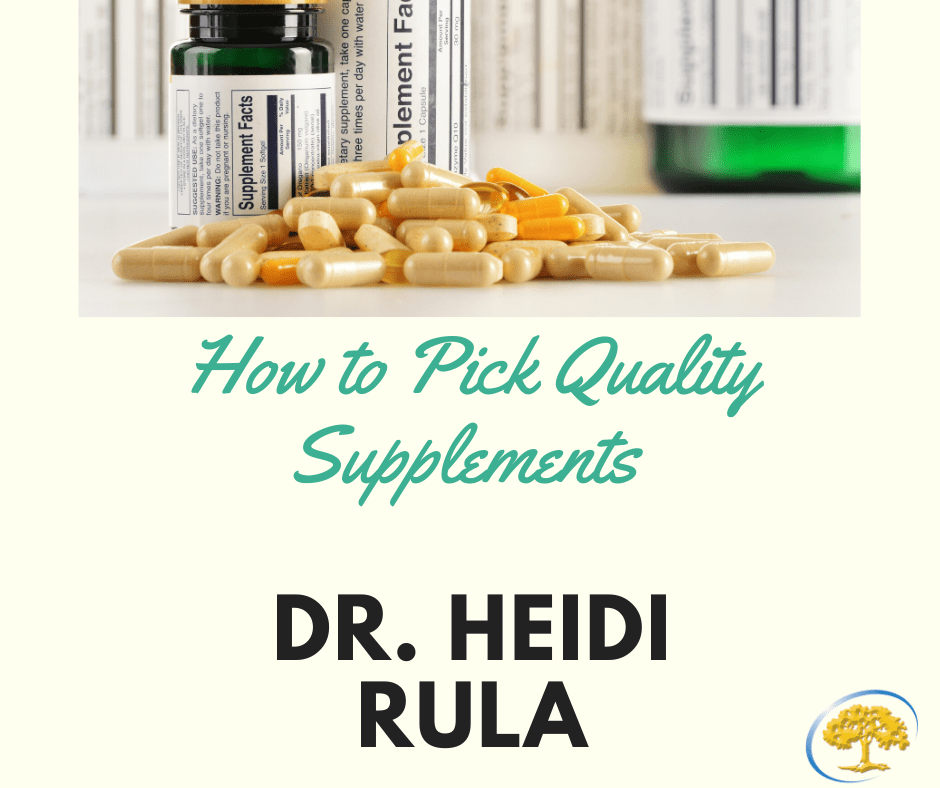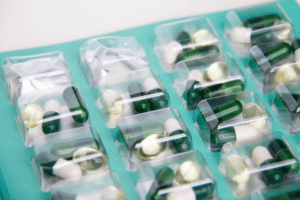
Posted 5 years ago
How To Pick Quality Supplements
Walking down the supplement aisle in the grocery or health food store can be an overwhelming experience for even the most educated consumer. Rows and rows of shelves filled with thousands of products reporting a whole host of health claims. Some of these products may contain heavy metals (like lead) or harmful chemical solvents or may not actually contain the dosage of the product listed on the label. So how do you know what product to pick? How do you know that you are getting a safe and quality product?

STEPS TO DETERMINE THE QUALITY OF A SUPPLEMENT:
- Does the company use a third-party lab for verification?
One of the most important thing to make sure of is that the product contains the active ingredients in the doses that are stated on the label and that there are not additional harmful ingredients in the product. Read the label or look on the company’s website to check if the company follows current good manufacturing practices (cGMP) laid out by the FDA. Even better, if the product carries a label like NSF, USP or Consumer Lab then you know that the manufacturer has taken the extra step to send their product out to an independent testing facility to ensure quality and purity. If this designation is not on the label, then I would check the company’s website to see if they report sending out their product for quality review. Consumer Labs also offers a subscription service for consumers to obtain access to the thousands of products that it tests so you can get information on the products you are taking.
- What kind of fillers do they use in their products?
Check to see what additives or fillers are in the product. Try to avoid supplements that include artificial colors, artificial flavors or shellac. You may want to also avoid supplements that contain lactose, corn or wheat if you are allergic to these foods. The higher quality manufacturers tend to avoid adding these additives, preservatives and common allergens.
- Does the company test its raw materials?
Do a little research on the company to see whether it does any testing on its raw materials. High quality manufacturers will test the bulk ingredients for quality and purity before putting them into production and perform batch testing on the final product. You can get this information on the company’s website or by calling or writing the company. In general, it is advised to steer clear of herbal products coming out of China and India because of the numerous reports of these products containing lead, mercury and arsenic.
- Is the company using the best form of a vitamin, mineral or herb in their product?
Many of the cheaper products out on the market will use the least expensive form of these ingredients to save costs. For example, Vitamin A is best delivered in the full spectrum of this vitamin , which is labeled as mixed carotenoids. Many low-quality vitamin products will use only one form of the vitamin like Beta-carotene or retinyl acetate. Same goes for Vitamin E, the full spectrum of the vitamin can be found on labels listed as mixed tocopherols but you will find that many companies will only include the less expensive forms such as dl-alpha tocopherol. Seeing the preferred form of these nutrients on the label can give you some confidence that the company is more interested in delivering the highest quality product. For herbs, it is best to see that the product contains a standardized extract of the active component of the herb when possible.
- Does that product make a lot of health claims?
Products in the weight loss, bodybuilding and sexual enhancement category have been the most problematic in terms of making unsubstantiated health claims. This category of supplements has also had the most problems with containing undeclared prescription drugs. If a company is making a lot of claims that seem too good to be true, that probably is the case and it is best to steer clear of the product.
Making sure you are using a quality supplement requires a bit of work on part of the consumer, but it is important to take the time to go through these verification steps to be make sure the product you are using is safe and effective.
 About Heidi Rula, M.D.
About Heidi Rula, M.D.
Dr. Heidi Rula joined Ironwood in 2018 to launch the Integrative Oncology program. She is board certified in family medicine and fellowship trained in Integrative Medicine. Dr. Rula has been a practicing physician in the Phoenix area for approximately 20 years and has been recognized by her colleagues as one of Phoenix’s “Top Doctors” on multiple occasions.
Dr. Rula has played a key role in bringing integrative medicine to the Valley. She served as the medical director of the University of Arizona Integrative Health Center where she leads a team of physicians and complementary practitioners in a unique model of integrative primary care that she helped to develop along with Dr. Weil and the UA Center for Integrative Medicine.
About Ironwood Cancer & Research Centers
Ironwood Cancer & Research Centers (ICRC) is the largest multi-specialty oncology network in the Greater Metro Phoenix area. They have over 100 medical providers, a robust Integrative Services program, and a dedicated clinical research department. Ironwood Cancer & Research Centers has 15 valley locations and five comprehensive cancer care centers that offer a multi-disciplinary approach for expedited personalized patient care. For more information, please visit www.ironwoodcrc.com.


 About
About